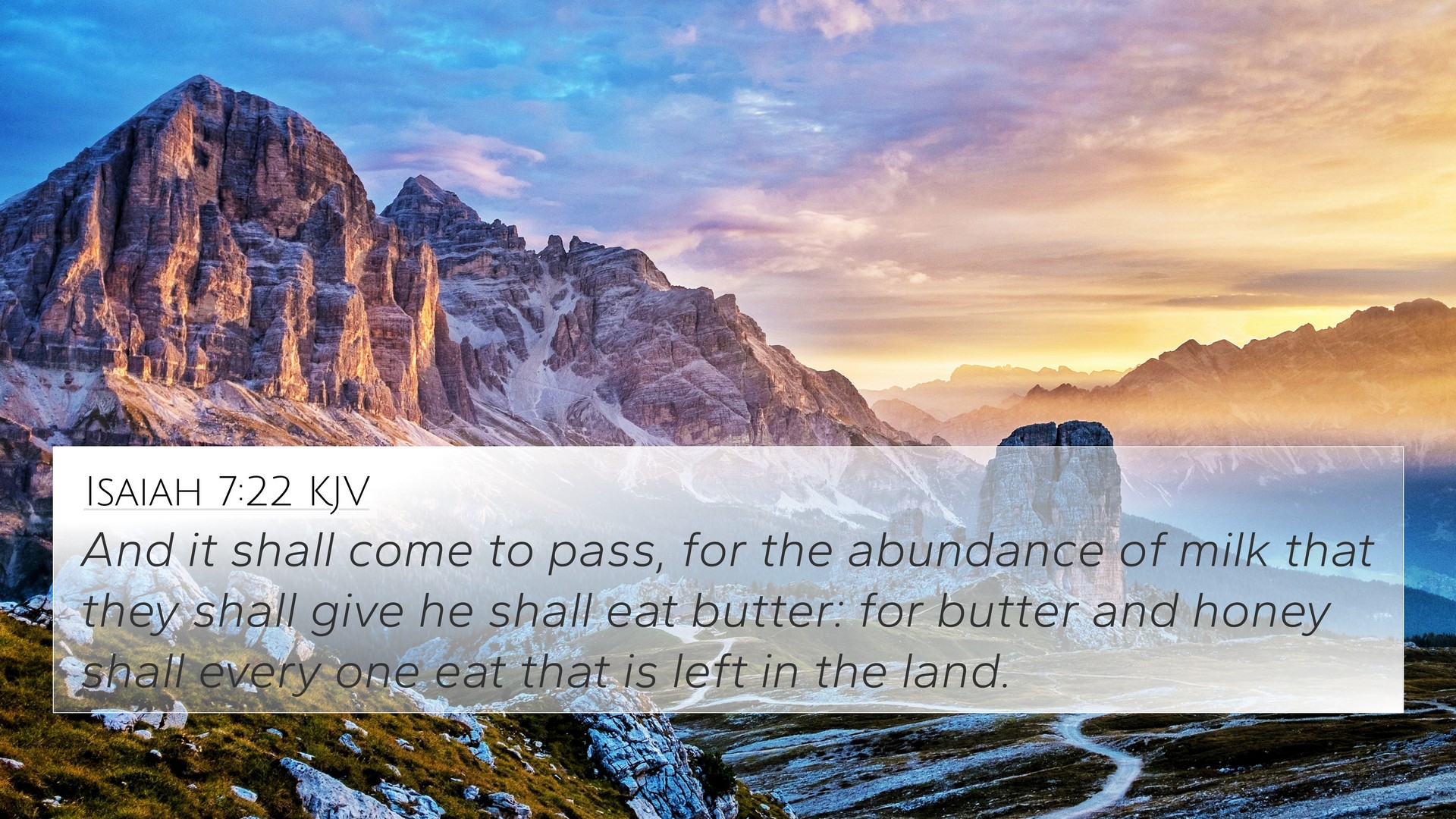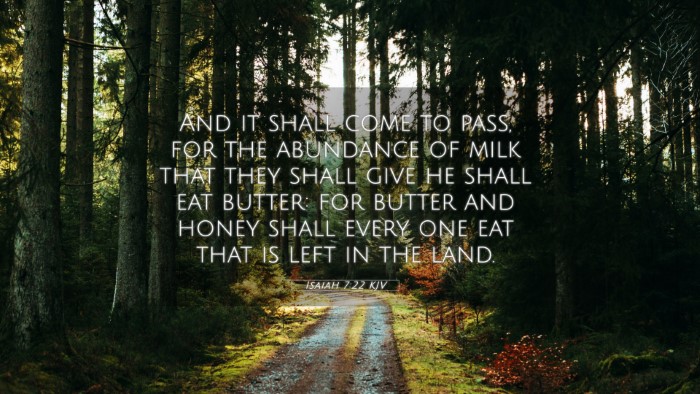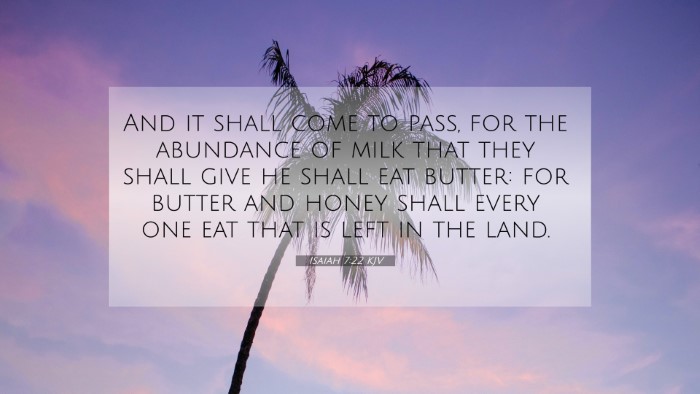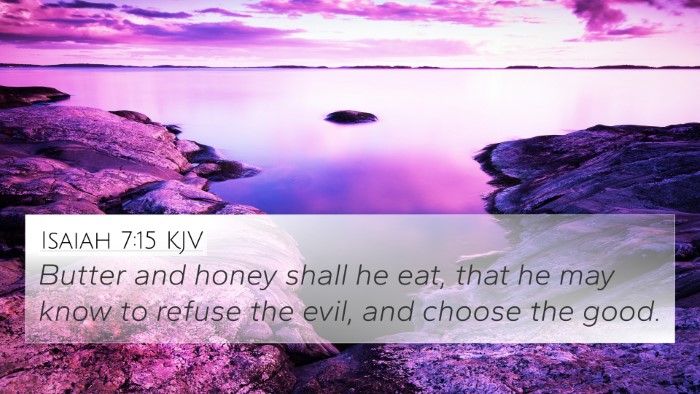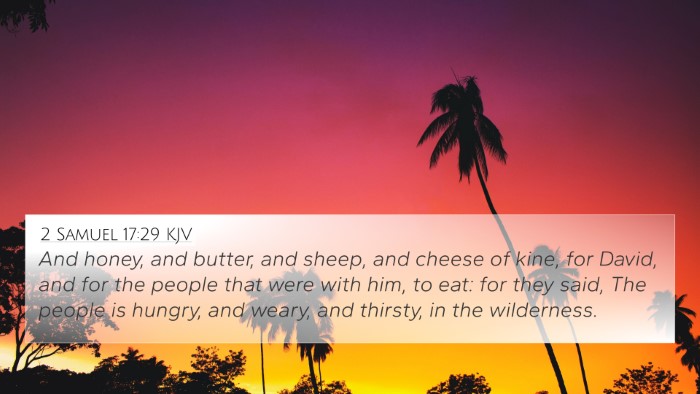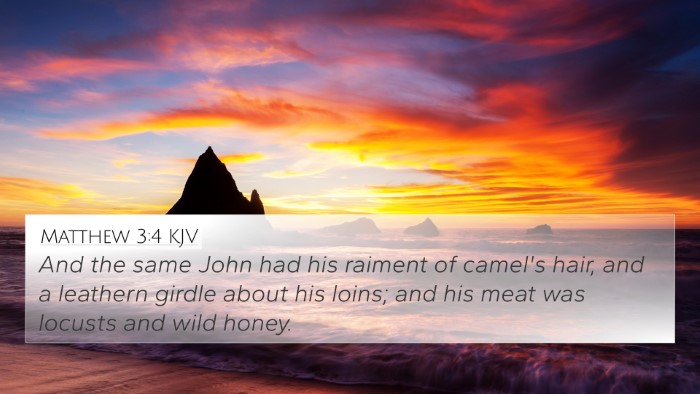Understanding Isaiah 7:22
Isaiah 7:22 states: "And it shall come to pass, for the abundance of milk that they shall give he shall eat butter: for butter and honey shall everyone eat that is left in the land." This verse captures the prophetic vision of the consequences faced by the people of Judah during the Syro-Ephraimite War, revealing both the hardship and the providential care of God amidst adversity.
Summary of Insights from Public Domain Commentaries
The insights derived from esteemed public domain commentaries like those of Matthew Henry, Albert Barnes, and Adam Clarke provide a multi-faceted understanding of this verse. The mention of "milk," "butter," and "honey" serves as a metaphor for the sustenance God provides during difficult times.
Matthew Henry's Commentary
Matthew Henry emphasizes that this verse illustrates God's provision even in desolation. The reference to consuming "butter" and "honey" suggests a return to basic sustenance during a time of scarcity, reminding readers of the abundance that God can offer in trying times. Henry further notes that these items symbolize the richness of the land and the divine assurance of survival amidst turmoil.
Albert Barnes' Notes
Albert Barnes elaborates on the societal implications within this verse. He points out that the reference to "butter and honey" indicates a humble diet that reflects the conditions of a decimated populace. According to Barnes, the prophecy signals a time when people shall be left with the simplest means of sustenance, yet also offers a hope of future restoration and abundance following devastation.
Adam Clarke's Commentary
Adam Clarke's analysis delves into the symbolic meanings behind the foods mentioned. He views "butter" as a representation of richness and "honey" as a symbol of delight. Clarke posits that the verse foreshadows not only physical sustenance but also spiritual nourishment that the people of Israel will encounter, reinforcing the idea that God will always provide for His people.
Cross-References for Isaiah 7:22
Understanding Isaiah 7:22 can be enhanced through examining connected verses. Here are several significant cross-references:
- Deuteronomy 31:20 - Indicates God's promise of abundance in the land flowing with milk and honey.
- Isaiah 7:15 - The same chapter addresses the theme of childlike purity and reliance on God's provision.
- Isaiah 65:25 - Speaks to the peaceful existence and abundance of God’s coming kingdom.
- Exodus 3:8 - God's promise of a land flowing with milk and honey is reiterated.
- Matthew 6:26 - Jesus highlights God's provision, paralleling the theme of reliance on divine sustenance.
- 1 Peter 2:2 - Urges believers to crave pure spiritual milk, which connects to the feeding metaphor.
- John 6:35 - Christ declares Himself as the bread of life, symbolizing the ultimate sustenance for believers.
- Psalm 81:16 - Natural wealth and provision are celebrated through the imagery of feast and abundance.
- Revelation 7:17 - References God providing for His people with sustenance and comfort.
- Philippians 4:19 - Assurance that God will provide all needs according to His riches in glory.
Conclusion
Isaiah 7:22 serves as a powerful reminder of divine providence in times of need. Through careful cross-referencing and thematic analysis, one can appreciate the richness of God's promise. The connections made with other Biblical texts can deepen one's understanding and highlight the cohesive narrative of God's care across scripture.
SEO Keywords Reflection
The analysis of Isaiah 7:22 can be linked to various themes such as Bible verse cross-references, connections between Bible verses, and cross-referencing Biblical texts. This exploration demonstrates how to find cross-references in the Bible and enriches the study of scriptures, ultimately guiding believers in their spiritual walk and enhancing their understanding of God's timeless provisions.
